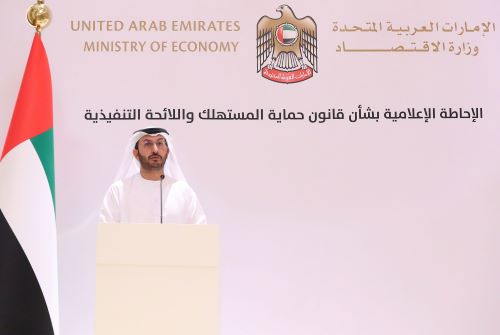Ministry of Economy reviews the new Consumer Protection Law and its implementing regulation

The Ministry of Economy held a briefing session today, during which it reviewed the main developments concerning the legislation and policies for the development of the UAE’s consumer protection system. These include Federal Decree Law No. 5 of 2023 amending the Federal Law No. 15 of 2020 on consumer protection, and its executive regulation issued by Cabinet Decision No. 66 of 2023. The briefing took place in the presence of H.E. Abdullah Al Saleh, Undersecretary of the Ministry of Economy.
H.E. Al Saleh said: “The new Consumer Protection Law and its implementing regulation represent a real milestone in the government’s efforts to develop the country’s consumer protection system in accordance with best practices. It has two dimensions: the first is the strengthening of the role of the local authorities in the enforcement of the consumer protection law more effectively by granting them all the necessary legislative powers. They have been granted inherent legal competencies in: i) receiving, following up and acting on consumer complaints, and ii) imposition of administrative sanctions and fines for acts committed in violation of the provisions of the law and its implementing regulation, and iii) acting on grievances submitted against decisions on punitive measures.”
He continued: “The second focus area is the strengthening of deterrent measures to ensure that the merchants, either retailers, traders or producers meet their legal obligations, to re-balance the contractual relationship between them and the consumers. In this context, the merchants’ obligations during the sale of a commodity or providing a service have been more elaborated, better clarified, and broadened to include nearly 43 obligations. This is in line with the strategic objectives of the Ministry to promote consumer rights and welfare in order to establish and ensure an enabling and secure environment when purchasing goods or receiving service.”
H.E. noted that the majority of the merchants obligations under the new law and regulation did not exist in previous legislations. This confirms a qualitative shift in legislation supporting consumer protection and guaranteeing all consumer rights in the country. It further contributes to the provision of service or commodity according to the highest quality standards as one of the objectives of the country to improve the quality of life of citizens and residents, and in line with the vision of “We the UAE 2031”.
Highlights of the new Consumer Protection Law and its executive regulation
• Establishes an integrated legislative system to protect consumers’ rights and provide the highest standards of protection to consumers when purchasing goods, and services from suppliers.
• For the first time in the country, a list of 46 offences has been introduced, with fines for the violation of some cases going up to AED 1 million, to deter any infringements on consumer rights guaranteed by the law and its implementing regulation.
• Establishes a more balanced and equitable merchant-consumer relationship by placing more than 43 commitments on providers and introducing integrated regulatory mechanisms and procedures to enable sound business practices and to enhance consumer satisfaction, happiness and well-being.
• Grants all necessary powers to the relevant local authorities to enforce the provisions of the law and the implementing regulation, including the reception and resolution of consumer complaints, imposing penalties and fines for violators and considering grievances.
• Provides consumers with a new complaint mechanism, expedited dispute resolution which avoids him going in every case to the judiciary through solid legal basis and clear procedures for imposing sanctions and fines.
• Supports promotion of good business practices in all the country’s markets, and strengthens oversight mechanisms for the competent local authorities.
• Enhances transparency and improves consumer experience by providing better service and greater protection to preserve their rights at various stages of the contractual relationship with the provider, giving it all guarantees it needs when purchasing goods or receiving services.
• Affirms the competence of the local authorities in accepting consumer complaints, specifying cases where the complaint should be examined by the Ministry, via mutual agreement between the Ministry and the competent authority.
• Prohibits the inclusion of any clause that could possibly harms the consumer; and prohibits monopolistic practices since around 14 examples of conditions or provisions that the provider is prohibited from including in contract forms, invoices or other documents in consumer contracting.
The Undersecretary said: “Thanks to visionary directives of the UAE leadership, today, the country boasts a cutting-edge legal framework dedicated to safeguarding consumer rights in line with global best practices. This comes amidst consecutive legislative advancements within our consumer protection system.” He referred to the ongoing collaborative efforts between Ministry of Economy and its public-private partners to enhance the compliance with national consumer protection regulations, promote ethical business conduct, strengthen market oversight, and uphold top-notch service and product delivery standards.
“The Ministry of Economy is currently collaborating with local government entities to develop a comprehensive system for efficiently managing and promptly addressing complaints. This initiative aims to boost consumer confidence and safeguard their rights in the country’s markets,” he added.
H.E. Al Saleh highlighted that the new Consumer Protection Law No. 5 of 2023 incorporates several amendments to certain provisions of Federal Law No. 15 of 2020 on consumer protection. These amendments have significantly enhanced the role of local authorities, strengthen the enforcement of the law, introducing more flexible and efficient mechanisms to advance government policies aimed at strengthening consumer protection at both federal and local levels.
In this context, H.E. Al Saleh highlighted these amendments, which include articles 5, 22, and 36, as detailed below:
- According to Article 5 of the Consumer Protection Law, a committee called the ‘Supreme Committee for Consumer Protection’ will be established by virtue of a UAE Cabinet decision upon recommendation from the Minister of Economy. This committee will operate under the Ministry’s purview and will be led by the minister himself along with several members. The purpose behind this amendment is to strengthen collaborative efforts within this committee that deals with various relevant bodies and broaden the composition of this committee that t will comprise representatives from local authorities alongside those from federal entities responsible for consumer protection such as the Ministry of Industry and Advanced Technology, Ministry of Climate Change and Environment, the Consumer Protection Association, as well as experts in this domain.
- With regard to Article 22, which concerns the Ministry’s role in protecting consumer rights, the amendment empowers the relevant authorities to protect the consumer rights. This is achieved through restructuring the process for handling consumer complaints and highlighting the responsibility of local authorities in imposing administrative penalties and fines on suppliers.
- As for Article 35 regarding grievances, local authorities have been assigned with the relevant jurisdiction to review grievances submitted by the interested party about decisions and actions taken by the head of the respective authority.
Furthermore, H.E. Al Saleh emphasized that these amendments focus on a set of key goals to strengthen the consumer protection system. These are:
- To empower relevant authorities in the enforcement of consumer protection laws by allowing local entities to impose administrative penalties and fines on those who violate consumer protection rights.
- To effectively complete the legal framework, allowing for larger involvement of local authorities in law enforcement, fostering collaboration at both federal and local levels and overcoming past challenges in fully enforcing regulations.
- To ensure that suppliers adhere to the regulations set forth in consumer protection laws, which is crucial for providing goods and services that meet high quality standards. This aligns with the government’s efforts to enhance the quality of life for both citizens and residents.
- To ensure a safe and conducive environment for both consumers and merchants/traders when entering into a purchase agreement or receiving services, ensuring that both parties have full awareness of their rights and responsibilities.
- To promote the flexibility and effectiveness of the UAE’s consumer protection system by providing opportunities for certain relevant federal bodies to join the Supreme Committee for Consumer Protection.
- To introduce a comprehensive complaint mechanism aimed at boosting transparency, expediting decision-making processes, and reinforcing support for competitiveness within the UAE’s business landscape. This initiative aims to position the UAE as a sustainable hub for leading brands. Additionally, the authority responsible for imposing administrative penalties and financial fines has been included as part of this effort. This means that grievances regarding decisions and actions taken by this authority can now be taken up directly with its head.
The Undersecretary further stated that the new executive regulations of the Consumer Protection Law outline a comprehensive plan for quality legal procedures and mechanisms. This plan provides a clear framework for the consumer protection system in the country in the upcoming phase. These include:
- The provision of all legal grounds to ensure necessary protection for consumers at different stages of their contractual relationship with suppliers in the field of goods and services. It imposes clear obligations on suppliers to fulfill their commitments to consumers regarding product/service specifications, quality, absence of defects, and guarantees for their use.
- Clarifications on various procedures, conditions, and requirements when a defect is found in a product or when there is a safety concern regarding its use. This covers the reporting procedure for the withdrawal of goods, the faulty product’s removal from shelves, retrieval of faulty items and their repair or replacement at no cost to consumers or alternatively providing full refund of the paid amount. Additionally, it outlines what should be included in reports and related timeframes.
- Each emirate within the country will have clearly designated local authorities responsible for receiving, examining, and addressing consumer complaints. This recognition acknowledges their national efforts and emphasizes their crucial role in strengthening consumer protection oversight across the UAE.
- Defining the supplier’s responsibilities regarding warranties, their duration, and enforcement methods. This includes ensuring that products are guaranteed for a specific period by either the manufacturer or an authorized agent. It also outlines how this period is calculated and specifies the required warranty documentation.
- Furthermore, the provider is obligated to refund the cost of goods that do not come with a warranty from an agent or distributor if any defects or malfunctions are found. This includes their responsibility in offering regular maintenance services for products without warranties, as well as ensuring availability of spare parts and delivering maintenance services while upholding their commitment to consumers.
- Incorporation of 14 contractual clauses that are deemed invalid in the contractual relationship between the supplier and the consumer, through which, the supplier may seek exemption from his responsibilities, or any obligations outlined in the law and its regulations towards the consumer.
- Ensures the creation of a safe and suitable environment for both consumers and merchants when entering into purchasing agreements or receiving services. This ensures that both parties have full awareness of their rights and responsibilities, which positively impacts the business environment improvement, service quality enhancement, product availability, and consumer satisfaction.
Re-balancing of the contractual relationship between customers and merchants by detailing the supplier’s obligations
H.E. highlighted that the new amendments to the law and its executive regulation have contributed to re-balancing the contractual relationship between customers and suppliers, making it more equitable and balanced. Suppliers’ obligations while selling products or services are set forth in more detail and a larger number of obligations are now specified. Thus, it obviates all unfair conditions that impact consumers in their contractual relationship with suppliers and brings more predictability and security in their relations.
Besides, H.E. explained that such obligations provide comprehensive mechanisms and procedures regulating fair trade practices. They include supplier’s obligations on the provision of substitute goods, contracting, warranties implementation, spare parts and their mechanism and repair; obligation to repair products with warranty and the periodic repair of products with warranty. Also covered are the supplier’s obligation upon discovering a defect in a product and reporting returns of products. Other obligations are also set forth in the regulation, including those concerning various categories of products and services.
New obligations on the supplier regarding spare parts, repair, and replacement of goods within specific periods of time
For the first time, supplier’s obligations regarding necessary spare parts and goods repair are detailed according to the nature of the customer demand. Furthermore, new mechanisms that regulate the examination of goods at laboratories are specified in case a dispute arises between the customer and the supplier on the quality of goods. This enhances the deterrent measures that help ensure the supplier’s obligation and consumer’s rights. For the first time, a seven to 30 days window has been determined to ensure the supplier’s obligation to provide spare parts or substitute goods, if a defect is found in goods provided.
A comprehensive list of penalties & fines for violations
In another context, H.E. Al Saleh discussed the introduction of the Law and its executive regulation with a detailed list of administrative penalties and fines for consumer protection violation. It includes a total of 46 types of violations, ranging from a fine of AED 100,000 up to AED 1 million. For example, a fine of AED 250,000 will be imposed on the supplier in case of failure to repair, maintain, provide after-sales services, return goods or refund within a certain time limit after a defect is discovered. A fine of 200,000 dirhams is imposed on the supplier in the event of failure to comply with standard specifications, rules and conditions of safety and health.
In this regard, H.E. Al Saleh explained that penalties will be applied, ranging from warning to fines. In some cases, they could lead to license cancellation or deregistration in the case of repeated offences. These penalties also contribute to protection of consumer rights in the country, reducing the litigation process for consumer protection as they cover all types of violations in this regard.
Pricing by unit to enable comparison and right decision-making
His Excellency said: “According to the new law, a new provision has been inserted, which mainly highlights that merchants shall not only put a selling price on goods, but rather price products by unit. This ensures the highest levels of transparency in setting prices, thus avoiding any misleading offers. It also enables consumers to choose from a range of alternative goods, and compare prices effortlessly.” The conditions and related requirements relevant to the implementation of this policy will be detailed through a ministerial decision.
Consumer and merchants urged to remain aware of their rights and obligations
His Excellency concluded his speech by urging consumers to be fully aware of one’s legal rights specified in the new legislation, in detail. The consumer should learn about mechanisms for claiming rights, as well as submitting claims and following it up. The Ministry also urged sellers, whether a manufacturer, merchant, distributor or a service provider, to consider the consumer’s rights and to be fully aware of their obligations towards them. This will contribute to reducing instances of claims and disputes, ensuring a customer protection system conducive to safe consumption/purchases, a stable ecosystem and a balanced economy characterized by transparency of highest standards. It accelerates the UAE’s journey towards becoming one of the 10 best cities for well-being by the next decade, in line with “We the UAE 2031” vision.
Mechanisms for receiving consumer complaints and action by local authorities
According to the new amendments to the Law and its executive regulations, the competent authority will examine the claims and proceed, after collecting a set of information from the complainant, including the following:
• The complainant’s name, address, capacity and date of complaint.
• The complainee’s name, address and nature of activity.
• Type of violation, and relevant evidence and documents, if any.
• Any documents or other necessary information requested by the concerned organization.
• The competent authority may refuse to accept complaints with missing information and supporting documents.
Last Updated on 1 year by News Desk 1













